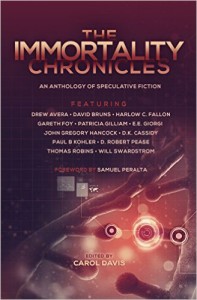The Immortality Chronicles: A Sci-Fi Anthology for a Cause
 I have to admit, I’m a little miffed at Amazon right now. According to their rules, I am ineligible to review The Immortality Chronicles, the latest in Samuel Peralta’s Future Chronicles series. Why? Just because I have a story in The Immortality Chronicles, I’m not able to offer my opinion about the other eleven pieces in the collection?
I have to admit, I’m a little miffed at Amazon right now. According to their rules, I am ineligible to review The Immortality Chronicles, the latest in Samuel Peralta’s Future Chronicles series. Why? Just because I have a story in The Immortality Chronicles, I’m not able to offer my opinion about the other eleven pieces in the collection?
Amazon should really have a special category and rules for books that are in support of worthy charities. In the case of The Immortality Chronicles, some proceeds are going to First Book, a non-profit that provides access to new books for children in need. To date, they’ve delivered over 130 million books to kids in the US and Canada. They’re helping to end illiteracy, what could be more worthy than that?
As always with themed collections, I find it fascinating the way different authors approach the subject.
Take Will Swardstrom’s story, “The Control.” He starts out with a poetic pronouncement:
There exists for everyone a moment…It was there, in that moment, where I lived. Always waiting. Always letting my fate be determined by others. Always hovering between a rousing triumph and a crushing catastrophe. I was that moment. But my moment was never under my control. I was always under his control.
When we meet Bek who is 5000 years old and a pawn in an immortal game, Swardstrom manages to pack a novel’s worth of action into a short story.
In “Eternity Today,” Thomas Robins has a surprisingly hopeful view of mankind. What if the world suddenly woke up to a planet-wide groundhog day, where the same day kept repeating over and over–and we all knew it. How would we react knowing that whatever we did, no matter how crazy or awful, would be reset at midnight? Forget about long-range planning, safe sex, driving with your seatbelt on or any other of the thousands of things we do every day. Chaos ensues, but from the anarchy a small group of people rise up to form the biggest crowdsourced action of all time. Not what I was expecting, by the way.
My story is called “Legacy” and it deals with the limits of humanity and technology. As we use bionics to extend our lives, how much is too much? Edward Stemm, a brilliant inventor, has extended his life for two hundred years and shows no signs of stopping. But in all that time and all those technological breakthroughs, he forgot about one thing: how to live. The story is a courtroom drama that shakes our Edward to the core of his bionic being.
And then there’s Harlow Fallon and her contribution, “A Long Horizon.” Here’s how she opens her story:
Space is a misnomer. If humans weren’t blind to it, they’d see that space is full, teeming with creatures that float and skim through the blackness…I don’t know why humans can’t see them. I see them all.
Pretty cool, huh? Her main character is a 900-year-old woman named Kate, who was taken when she was barely eighteen years old and en route to the New World on a wooden sailing ship. Now, in present day, she’s a convict on a prison ship that was jettisoned “like trash into the abyss of space” as a manned space probe. The trip is intended to be one way.
Oh, and those creatures that “float and skim in the blackness”? They show up again…
I could go on. EE Giorgi, a favorite of mine, has a wonderful, heartbreaking little gem called “The House of the Cliff,” for example. But I’ll stop here to give you time to go get your copy. Go on, you, right now.
On sale for $2.99 for a limited time.
 David Bruns is the creator of the sci-fi series The Dream Guild Chronicles, one half of the Two Navy Guys and a Novel blog series about co-writing a military thriller, and co-author of Weapons of Mass Deception, a story of modern-day nuclear terrorism.
David Bruns is the creator of the sci-fi series The Dream Guild Chronicles, one half of the Two Navy Guys and a Novel blog series about co-writing a military thriller, and co-author of Weapons of Mass Deception, a story of modern-day nuclear terrorism.
Find out how to get the David Bruns Starter Library for free.

